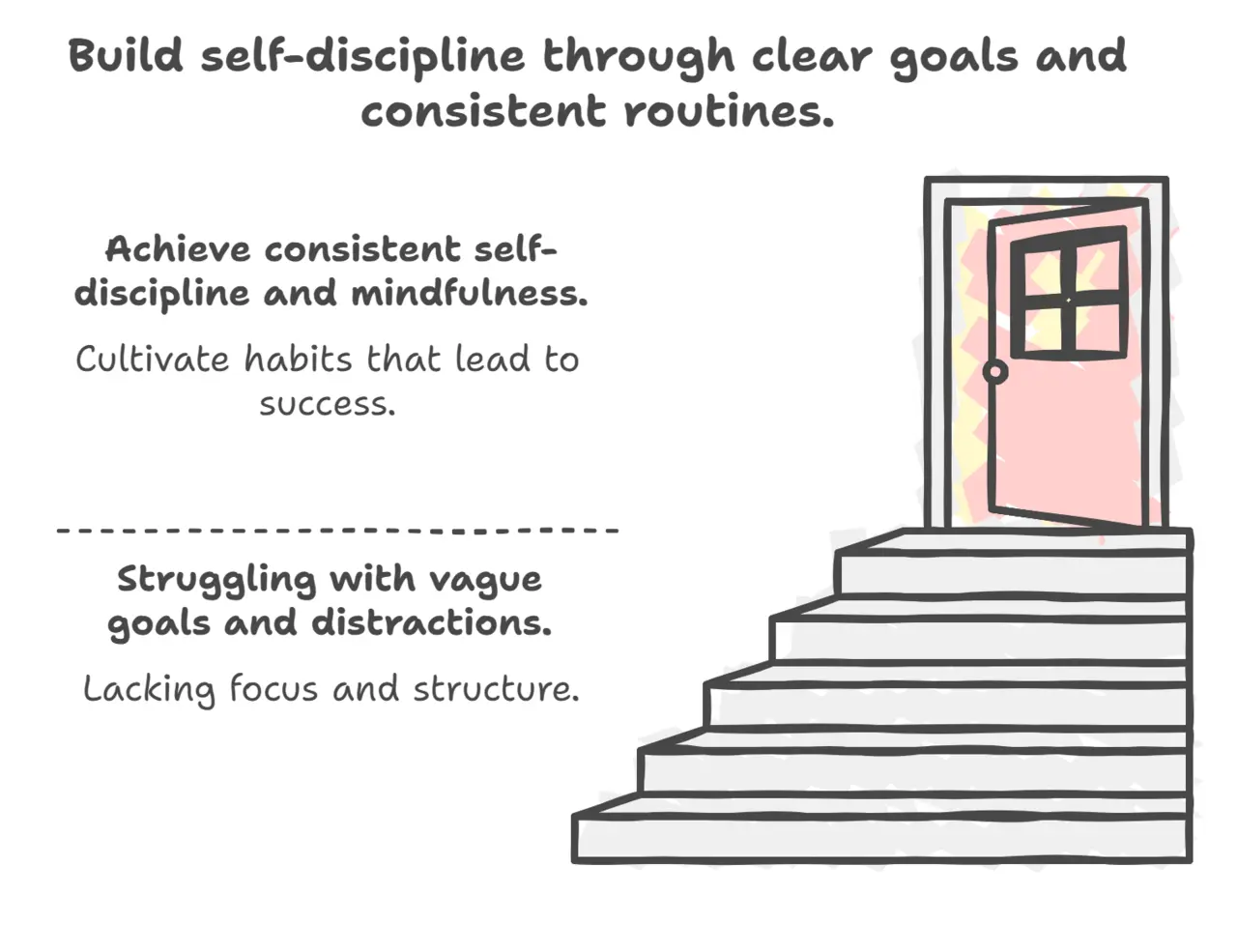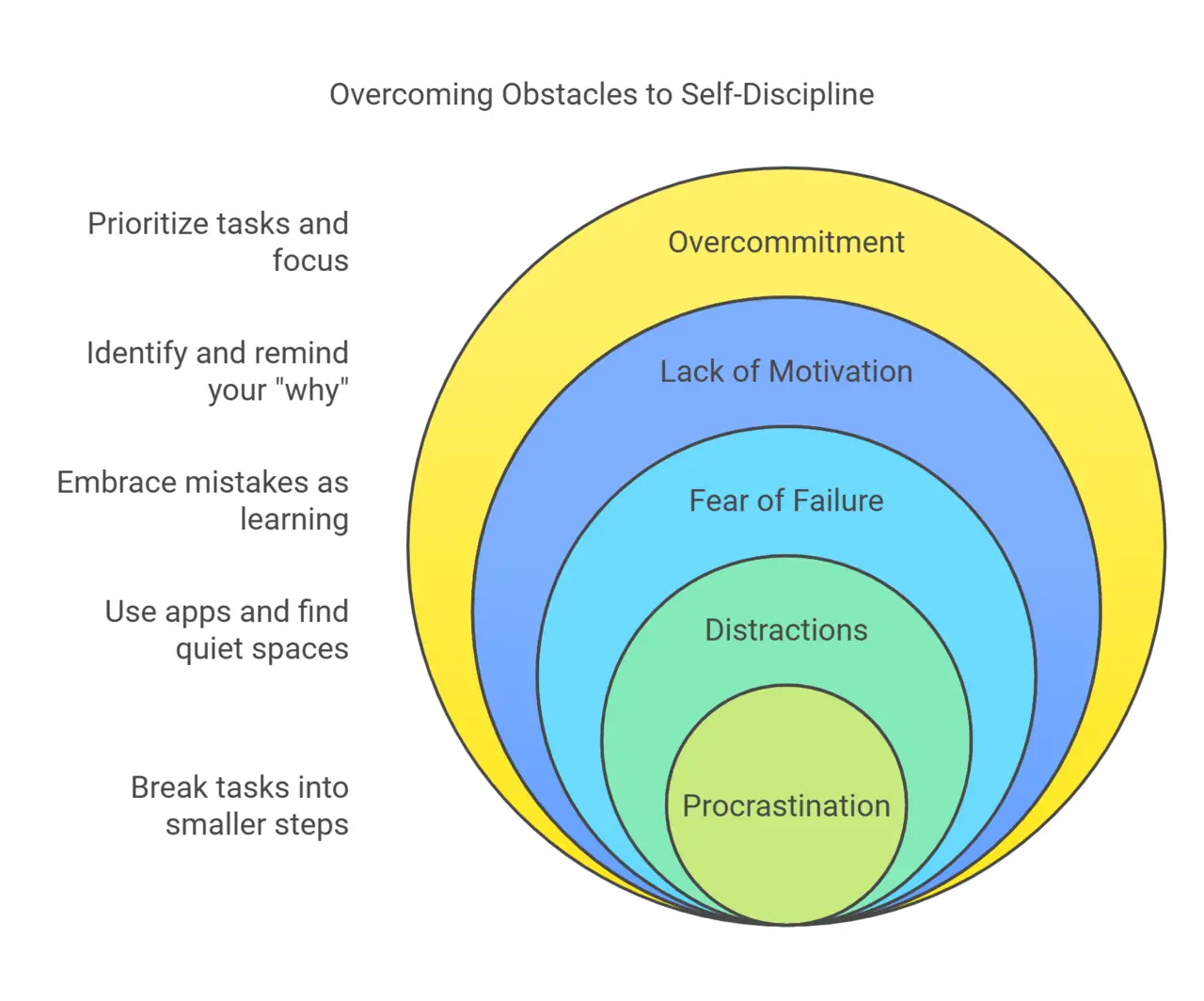Self-Discipline Techniques That Will Change Your Life!

You wake up ready to tackle the day, coffee in hand, only to get sidetracked by social media. Before you know it, hours have slipped by. Sound familiar? If so, you’ve faced the challenge of self-discipline.
Self-discipline is the ability to guide your thoughts, emotions, and actions to achieve your goals. Some people see it as a talent reserved for a lucky few, while others view it as endless self-denial.
Self-discipline is a skill anyone can develop with consistent practice, thoughtful strategies, and a long-term mindset. It helps you manage your time, achieve personal growth, and stay steady while challenged.
In this guide, you’ll learn:
Let’s get started!
What Is Self-Discipline?
Self-discipline is focused on what matters, even when distractions or emotions tempt you to give up. It’s like a muscle you strengthen over time; the more you practice, the stronger it gets.
Psychologists call this self-regulation: controlling impulses, managing stress, and making choices that align with your goals. Research by Oaten and Cheng in 2006 proved that practicing self-regulation through physical exercise for two months improved self-control in multiple life areas, from eating habits to study routines.
Self-discipline bridges where you are now with where you want to be. Each small, consistent step moves you forward. You don’t need perfection. You need persistence.
Why Is Self-Discipline Important?
Self-discipline drives success in every life area. Without it, big goals feel impossible and progress stays inconsistent.
Research shows self-discipline predicts academic achievement better than IQ. In one study, self-discipline accounted for twice as much variance in final grades compared to intelligence scores.
With self-discipline, you focus on long-term benefits instead of short-term comfort. Skipping a video binge to study might not feel fun, but it pays off when you ace your test.
How Can I Improve Self-Discipline?
1. Use If-Then Planning
If-Then Planning automates your behavior by linking specific situations to planned responses. When you create an “if-then” plan, you mentally prepare: “If X happens, then I will do Y”.
Psychology research shows this technique reduces the mental effort needed for self-control. Studies found that people who use if-then planning show decreased activity in brain areas linked to effortful control, making goal pursuit feel easier.
How to apply it: Write down your trigger and response. Example: “If I feel the urge to check social media while working, then I will take a five-minute walk instead”.
2. Practice Regular Physical Exercise
Oaten and Cheng’s landmark 2006 study proved that regular exercise strengthens self-regulation across all life areas. Participants who exercised for two months showed improvements in emotional control, study habits, spending monitoring, and household chores.
The research tracked 24 participants over four months. During the exercise phase, they reported decreased stress, reduced alcohol and caffeine consumption, and increased healthy eating. These gains happened because exercise trains your self-regulatory capacity like a muscle.
How to apply it: Start with 20 minutes of exercise three times per week. Track your progress monthly to see improvements beyond fitness.
3. Build Simple Routines
Routines remove decision fatigue. When actions become automatic, you conserve willpower for harder challenges.
Start your day with a consistent morning sequence: wake time, hydration, movement, and planning. This creates momentum that carries through your day.
How to apply it: Choose three daily actions to automate. Do them at the same time every day for 30 days until they feel effortless.
4. Set Clear and Specific Goals
Vague goals like “get healthier” lead nowhere. Specific goals like “walk 30 minutes daily after dinner” create clear action steps.
Break big goals into weekly targets. This makes progress measurable and keeps you motivated.
How to apply it: Write goals using numbers and deadlines. “Read 20 pages daily for 30 days” beats “read more books”.
5. Practice Mindfulness and Focus
Mindfulness strengthens your awareness of impulses before you act on them. Studies show that mindful people resist temptation better because they notice urges without automatically following them.
How to apply it: Spend five minutes daily observing your breath. When thoughts arise, notice them and return to breathing. This trains impulse awareness.
6. Delay Gratification Strategically
Delaying gratification means choosing bigger future rewards over smaller immediate ones. This skill predicts long-term success across career, health, and relationships.
How to apply it: When tempted, wait 10 minutes. Often, the urge passes. If it doesn’t, you can choose consciously rather than impulsively.
What Are Common Obstacles to Self-Discipline?
Even with the best intentions, it’s easy to get off track. Here are some common challenges, what they look like, and simple ways to overcome them:
1. Procrastination
2. Distractions
3. Fear of Failure
4. Lack of Motivation
5. Overcommitment
How long does it take to build self-discipline?
Research shows measurable improvements in as little as two weeks, with substantial changes appearing after two months of consistent practice.
Can self-discipline be learned at any age?
Yes. Self-regulation capacity improves with practice regardless of starting age. The key is consistent, small actions over time.
What’s the difference between self-discipline and willpower?
Self-discipline is the broader skill of guiding behavior toward goals. Willpower is the immediate resistance to temptation. Both work together and strengthen through practice.
Does self-discipline work for people with ADHD?
Yes, with modifications. People with ADHD benefit from external structure, clear routines, and environmental design that reduces distractions.
How do I recover from a self-discipline setback?
Treat setbacks as data, not disasters. Analyze what triggered the slip, adjust your approach, and resume your practice the next day.

Daily Exercises to Strengthen Self-Discipline
Here are practical exercises you can try every day to build your self-control:
How Self-Discipline Helps You Reach Your Goals
Self-discipline is the key to turning big dreams into small steps that you can take each day. When you stay consistent, you build momentum, and progress becomes easier.
Here are a few examples:
Each small step matters. Over time, self-discipline turns effort into results.
Subscribe to Create Higher Vibrations!
Get Inspiration and Practical advice straight to your inbox.
Final Thoughts
Building self-discipline doesn’t mean being perfect or pushing yourself too hard. It’s about making small, consistent choices that help you reach your goals. Start with one step at a time, celebrate your progress, and keep going when it gets tough.
Every time you practice self-discipline, you’re becoming a stronger and more capable version of yourself.
Key Takeaways:
With self-discipline, you transform effort into results. Each day you practice, you become stronger and more capable. Start with one technique today. Your future self will thank you.




